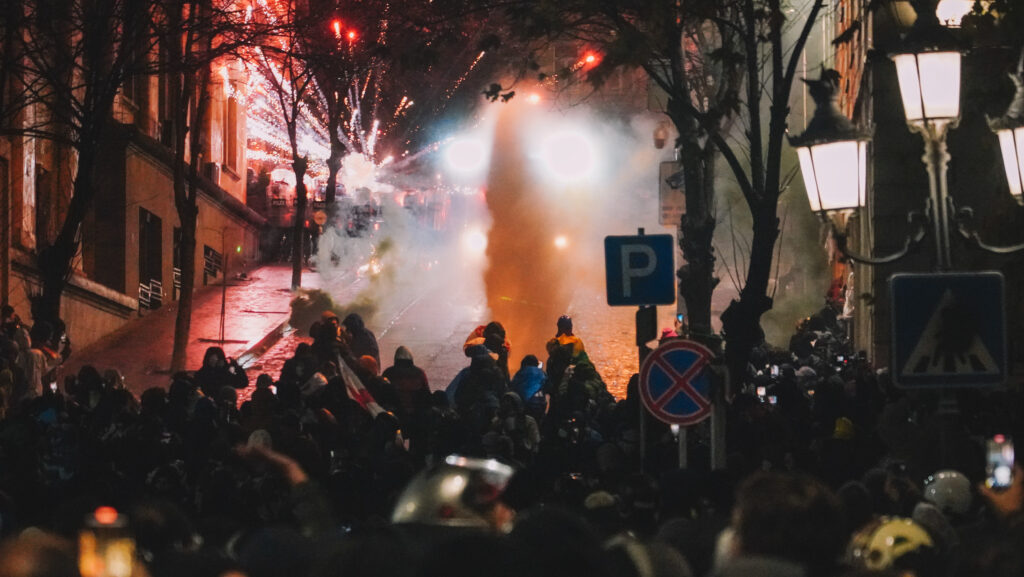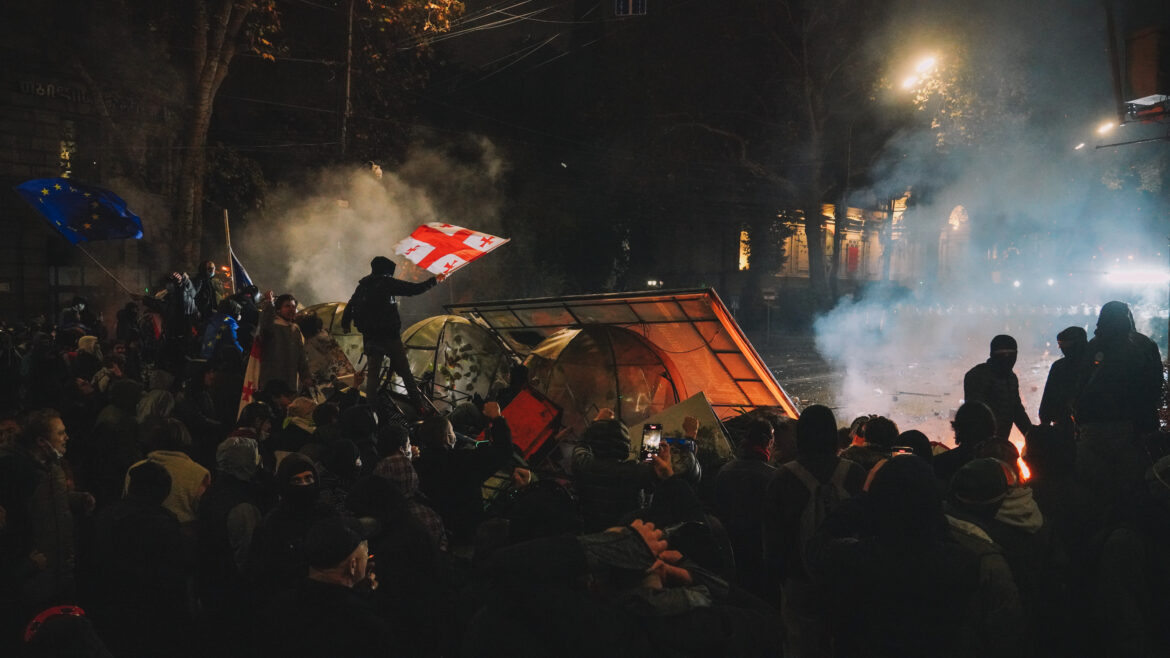Tbilisi, Georgia (December 2, 2024) — Rallies against the newly elected parliament continue in the capital of Georgia, Tbilisi. Thousands of people with flags demand to declare the 2024 elections illegitimate and demand re-elections to the Georgian parliament.
Protests in Georgia rocked the country at the end of October, immediately after the results of parliamentary elections were announced, according to which the pro-Russian party Georgian Dream, led by Bidzina Ivanishvili, received the majority of votes. Several hundred students were the first to protest at the parliament building in Tbilisi, as during the Revolution of Dignity in Ukraine. Later, the protests turned into large-scale rallies.
In order to silence the protests and disperse the people, the security forces started using water cannons and tear gas against the demonstrators. Over the past few days, more than 200 protestors have been detained in the capital of Georgia. According to the official data, on the night of December 2, 37 victims were brought to the Tbilisi hospital with injuries of various degrees of severity. Despite that, after each night of crackdowns, people kept fighting for their freedom and the European future of their country.
The ongoing situation in Georgia has drawn international attention as calls for accountability and respect for democratic principles continue to grow. In addition, on 30 November, MEPs initiated a letter to the new EU High Representative for Foreign Affairs and Security Policy, Kaja Kallas, urging the EU to impose sanctions on Georgian officials responsible for electoral fraud, democratic backsliding, and the repression of civil society.
The Georgian opposition has been protesting for the fifth day against the authorities’ decision to freeze negotiations on joining the EU until 2028. The police are trying to disperse the protesters and are detaining people, and Prime Minister Iraklii Kobakhidze has declared that he will not allow the “Ukrainization of Georgia.”
Following Georgian Dream’s November 28 decision to halt EU accession talks, EU leaders, including High Representative Kaja Kallas, Enlargement Commissioner Marta Kos, and Commission President Ursula von der Leyen, expressed regret over the shift away from European integration. They condemned police violence against peaceful protesters in Tbilisi and highlighted concerns over Georgia’s democratic backsliding, citing irregularities in the disputed October 26 parliamentary elections. EU financial assistance remains on hold, with leaders stressing that Georgia’s return to the EU path depends on its leadership. The EU reaffirmed support for the Georgian people’s choice for a European future.
Another crucial turn following the elections result is that United States suspended its Strategic Partnership with Georgia following Georgian Dream’s unilateral suspension of EU accession negotiations, citing GD’s anti-democratic actions and excessive force against protesters. The U.S. State Department condemned GD’s decision as a betrayal of Georgia’s constitutional commitment to European integration, leaving the country more vulnerable to Kremlin influence.
President Salome Zurabishvili called the suspension a tragic result of GD’s anti-Western policies. Relations between the U.S. and GD have deteriorated over two years, marked by democratic backsliding, media repression, and controversial laws. The U.S. imposed sanctions on corrupt judges, visa restrictions on officials undermining democracy, and postponed military exercises. New U.S. legislation proposes further measures in response to GD’s actions.
New presidential elections are to be held in Georgia on December 14. The current president of Georgia, Salome Zurabishvili, said that the parliament was elected illegally and undemocratic and, therefore, does not have the authority to re-elect the country’s new leader.
However, the protests continued and spread across the country — from the capital of Georgia, Tbilisi, to Batumi, Kutaisi, Zugdidi, Rustavi, Senaki, Khashuri, and Poti — the country’s main cities.
For Georgia this is not just another protest; this is a turning point. The unrest reflects frustration over electoral fraud, political polarization, and a government that continues to move away from democratic principles. For Georgia, this is a fight for its sovereignty, its values, and its place in Europe.
If you’re moved by Georgia’s struggle for democracy, you might wonder how someone outside the country can make a difference. The good news is that meaningful actions aren’t confined by borders. Here’s how you can help — concise, actionable, and in the spirit of clarity.

Here’s what you can do:
- Start with Awareness. The first step to helping any cause is to understand it. Learn about Georgia’s political history, its ties to Europe, and the ongoing protests. Knowledge will help you communicate the issues effectively. Rely on reputable sources like international organizations, news outlets, or academic publications to get the full picture. Resist sensationalism — focus on facts.
- Speak Up. Use your voice to amplify Georgia’s story. Social media can be a powerful tool for highlighting injustice. Share verified information about the protests and electoral concerns. Avoid jargon or vague platitudes. Speak plainly to inspire action.
- Connect with Advocacy Groups. Many organizations are already working to support democracy in Georgia. Local Georgian NGOs could use your support. Whether it’s financial aid, volunteering, or spreading their message, these groups benefit from international backing.
- Support Media and Journalism. Independent journalism is vital, especially in times of political turmoil. Subscribe to or donate to outlets that cover Georgia thoroughly. Credible information ensures global accountability.
- Join or Host Events. Look for events in your city — protests, panels, or fundraisers — for Georgia’s cause. If none exist, consider organizing one.
- Donate. If you’re able, contribute to organizations providing legal aid to arrested protesters or supporting civil society initiatives in Georgia. Verify where your money goes; transparency is key.
Remember, changes don’t happen overnight. Stay informed and engaged. Your efforts are part of a global push for justice and democracy.
